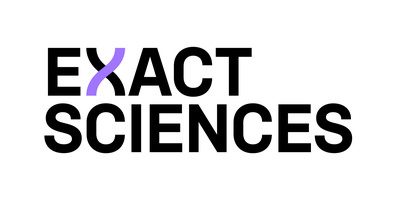Exact Sciences announced that nearly 3 million people have been screened for colorectal cancer with Cologuard since FDA approval with half of those tested being previously unscreened.
ABOUT HALF OF THOSE TESTED WITH COLOGUARD WERE PREVIOUSLY UNSCREENED
MADISON, Wis., Sept. 10, 2019 /PRNewswire/ -- (NASDAQ: EXAS) -- Exact Sciences announced today that nearly 3 million people have been screened for colorectal cancer with Cologuard since FDA approval with half of those tested being previously unscreened. Not only is Cologuard increasing the number of screened Americans, peer reviewed data shows that Cologuard is a cost-effective alternative for people at average risk for colorectal cancer (CRC).

Data conclusively shows that screening reduces colorectal cancer incidence and mortality. However, for over a decade, 1 out of every 3 Americans eligible for screening under current guidelines has gone unscreened, leading to colorectal cancer incidence and mortality rates that are higher than they should be. Cologuard is an innovative, stool-based DNA test that was created to help improve the nation's stagnant screening rate.
Cologuard became available for average risk screening when it was approved by the FDA in 2014, was included among the "A" rated screening options in the 2016 U.S. Preventive Services Task Force (USPSTF) guidelines for CRC screening, and has broad market access with 94% of the patients who use it having $0 cost share. Our goal is to improve screening rates by making available a convenient, non-invasive and highly sensitive alternative for people and health care providers.
A growing body of literature shows Cologuard is a cost-effective test in an average risk colorectal cancer screening population, including a recent analysis by Naber, et al., which found that Cologuard is cost-effective, as compared to no screening, but less cost-effective, as compared to certain other screening methods. However, Exact believes that the Naber analysis and other analyses that utilize the CISNET models understates Cologuard's value proposition, by employing unrealistic assumptions, such as adherence rates (i.e., 100% adherence, or relative adherence over a fairly narrow range) for screening, follow-up and surveillance procedures. This academic approach is not reflective of clinical practice. In order to overcome these limitations, it is recommended that Naber and others utilizing CISNET models for analysis incorporate more accurate real-world data regarding adherence rates.
"The CISNET models utilized in a recent article by Naber et al. have limitations that persist from earlier studies, which influence the findings," said Steven Itzkowitz, M.D. gastroenterologist and Professor of Medicine at Mount Sinai Health System. "The colorectal cancer screening community needs to work more collaboratively to address the limitations of these models and generate a more well-rounded body of evidence that considers real world adherence rates and the biology of important precancerous lesions to help get patients screened."
"Cologuard is meaningfully impacting patient screening by reaching nearly 3 million people," said Mark Stenhouse, President of Cologuard. "Cologuard offers increased sensitivity for colon cancer and pre-cancer relative to FIT as observed in the landmark Deep-C study and includes a built-in patient navigation program, which resulted in an 88% compliance rate among a previously non-compliant Medicare population."
Exact Sciences remains focused on the millions of Americans who still need to be screened for colon cancer and is taking an active role to generate a more well-rounded body of evidence which supports better inputs to future modeling, comparative-effectiveness and cost-effectiveness studies.
Dr. Itzkowitz has been a consultant for Exact Sciences.
Contact: Cara Connelly, Exact Sciences, 614-302-5622 cconnelly@exactsciences.com
About Exact Sciences Corp.
Exact Sciences Corp. is a molecular diagnostics company working to deliver life-changing innovations in earlier cancer detection. The company has exclusive intellectual property protecting its non-invasive, molecular screening technology for the detection of colorectal cancer. Now, Exact Sciences is investing in its product pipeline and collaborating with industry-leaders with the goal of taking on the world's deadliest cancers. For more information visit www.exactsciences.com.
About Cologuard
Cologuard is intended for the qualitative detection of colorectal neoplasia associated DNA markers and for the presence of occult hemoglobin in human stool. A positive result may indicate the presence of colorectal cancer (CRC) or advanced adenoma (AA) and should be followed by diagnostic colonoscopy. Cologuard is indicated to screen adults of either sex, 50 years or older, who are at typical average-risk for CRC. Cologuard is not a replacement for diagnostic colonoscopy or surveillance colonoscopy in high risk individuals.
Cologuard is not for high risk individuals, including those with a history of colorectal cancer and adenoma, a family history of colorectal cancer, IBD or certain hereditary syndromes. Positive Cologuard results should be referred to diagnostic colonoscopy. A negative Cologuard test result does not guarantee absence of cancer or advanced adenoma. Following a negative result, patients should continue participating in a screening program at an interval and with a method appropriate for the individual patient. Cologuard performance when used for repeat testing has not been evaluated or established. Rx only.
Forward-Looking Statements
This news release contains forward-looking statements within the meaning of Section 27A of the Securities Act of 1933, as amended, and Section 21E of the Securities Exchange Act of 1934, as amended, that are intended to be covered by the "safe harbor" created by those sections. Forward-looking statements, which are based on certain assumptions and describe our future plans, strategies and expectations, can generally be identified by the use of forward-looking terms such as "believe," "expect," "may," "will," "should," "would," "could," "seek," "intend," "plan," "goal," "project," "estimate," "anticipate" or other comparable terms. All statements other than statements of historical facts included in this news release regarding our strategies, prospects, financial condition, operations, costs, plans and objectives are forward-looking statements. Examples of forward-looking statements include, among others, statements we make regarding expected future operating results, anticipated results of our sales and marketing efforts, expectations concerning payer reimbursement and the anticipated results of our product development efforts. Forward-looking statements are neither historical facts nor assurances of future performance. Instead, they are based only on our current beliefs, expectations and assumptions regarding the future of our business, future plans and strategies, projections, anticipated events and trends, the economy and other future conditions. Because forward-looking statements relate to the future, they are subject to inherent uncertainties, risks and changes in circumstances that are difficult to predict and many of which are outside of our control. Our actual results and financial condition may differ materially from those indicated in the forward-looking statements. Therefore, you should not rely on any of these forward-looking statements. Important factors that could cause our actual results and financial condition to differ materially from those indicated in the forward-looking statements include, among others, the following: our ability to successfully and profitably market our products and services; the acceptance of our products and services by patients and healthcare providers; our ability to meet demand for our products and services; the willingness of health insurance companies and other payers to cover our products and services and adequately reimburse us for such products and services; the amount and nature of competition from other cancer screening and diagnostic products and services; the effects of the adoption, modification or repeal of any law, rule, order, interpretation or policy relating to the healthcare system, including without limitation as a result of any judicial, executive or legislative action; the effects of changes in pricing, coverage and reimbursement for our products and services, including without limitation as a result of the Protecting Access to Medicare Act of 2014; recommendations, guidelines and quality metrics issued by various organizations such as the U.S. Preventive Services Task Force, the American Cancer Society, and the National Committee for Quality Assurance regarding cancer screening or our products and services; our ability to successfully develop new products and services; our ability to effectively utilize strategic partnerships, such as our Promotion Agreement with Pfizer, Inc., and acquisitions; our success establishing and maintaining collaborative, licensing and supplier arrangements; our ability to maintain regulatory approvals and comply with applicable regulations; and the other risks and uncertainties described in the Risk Factors and in Management's Discussion and Analysis of Financial Condition and Results of Operations sections of our most recently filed Annual Report on Form 10-K and our subsequently filed Quarterly Reports on Form 10-Q. We undertake no obligation to publicly update any forward-looking statement, whether written or oral, that may be made from time to time, whether as a result of new information, future developments or otherwise.
![]() View original content to download multimedia:http://www.prnewswire.com/news-releases/cologuard-helps-more-people-get-screened-in-a-cost-effective-way-300914767.html
View original content to download multimedia:http://www.prnewswire.com/news-releases/cologuard-helps-more-people-get-screened-in-a-cost-effective-way-300914767.html
SOURCE EXACT SCIENCES CORP
Company Codes: NASDAQ-SMALL:EXAS




